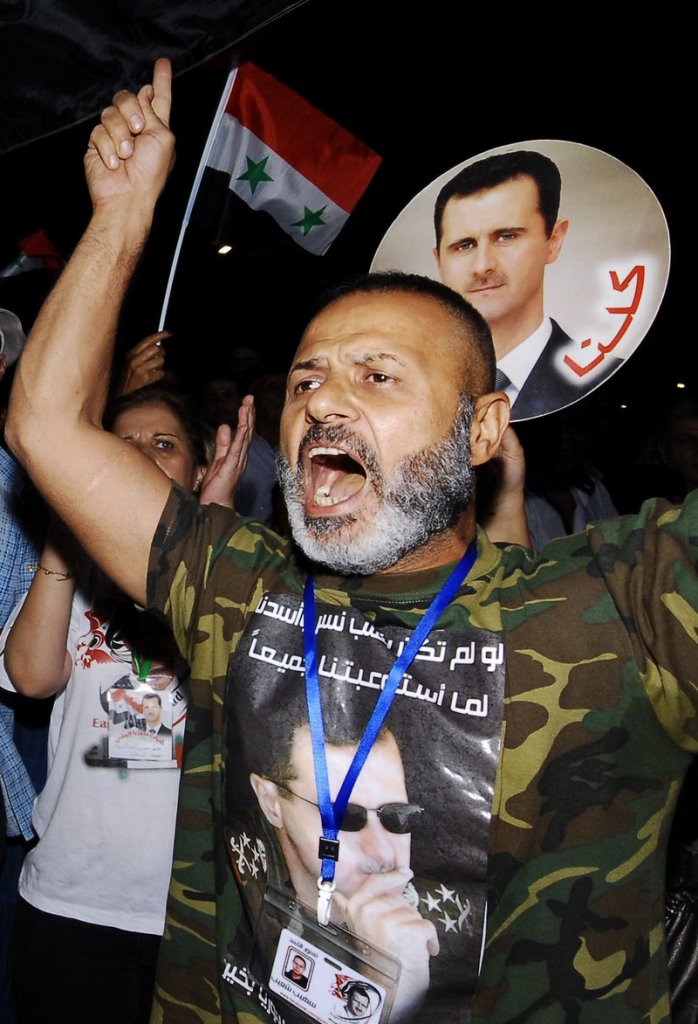BEIRUT – Syrian security forces killed at least 20 protesters Friday despite promises by President Bashar Assad that the military operations against the 5-month-old uprising are over.
The killings, which came as thousands poured into the streets across Syria, suggest the autocratic leader is either unwilling to stop the violence — or not fully in control of his own regime.
Assad, who inherited power from his father in 2000, is facing the most serious international isolation of his rule. On Thursday, the United States and its European allies demanded he step down.
Military operations have subsided in the past few days, following a fresh crackdown on major flashpoint cities that started at the beginning of the month to root out anti-government protesters.
But persistent gunfire and shootings, along with Friday’s killings, underscore the difficulty of any kind of diplomatic pressure achieving results in the absence of any appetite for military intervention.
Human rights groups said Assad’s forces have killed nearly 2,000 people since the uprising erupted in mid-March. A high-level U.N. team recommended Thursday that the violence in Syria be referred to the International Criminal Court over possible crimes against humanity.
“Bye, bye Bashar, see you in The Hague!” protesters shouted Friday in the central city of Homs as crowds filled the streets, spurred on by the international condemnation.
ICC prosecutor Luis Moreno-Ocampo said he has received reports of atrocities in Syria but has no jurisdiction “at this stage” to open an investigation because Damascus does not recognize the court.
He said he could begin investigating at the request of the U.N. Security Council. Syria’s U.N. ambassador said a U.N. humanitarian assessment team will arrive in Damascus today.
The International Committee of the Red Cross also said it is optimistic Syrian authorities will grant the humanitarian organization access to all detainees in the country “within weeks.”
The number of protesters Friday appeared to be markedly lower than in previous weeks, largely due to the crackdown and security presence. But amateur video posted online by activists showed thousands of protesters in various areas, some calling for Assad’s departure, others for his execution.
“We will not sell the blood of our martyrs,” read a banner in Hilfaya, near Hama.
The unrest has laid bare old resentments in Syria, a mostly Sunni Muslim country with a potentially explosive sectarian mix. Beset by popular upheaval, Assad is increasingly relying on a coterie of relatives from his tiny Alawite sect, leading to speculation about how much power he wields over them.
His younger brother, Maher, is key, believed to be in command of much of the current bloody crackdown. Chief of Syria’s elite forces and reputed to have once shot a brother-in-law in the stomach in a family feud, Maher’s recent tactics have been denounced as inhumane by the prime minister of neighboring Turkey.
Maher Assad, 42, is commander of the army’s 4th Division, regarded as Syria’s best-equipped and most highly trained forces, and of the six brigades of the Republican Guard, responsible for protecting Damascus.
Since the uprising began, activists say, Maher’s troops have played a role in anti-dissident operations in the southern city of Daraa, the coastal city of Banias, the central province of Homs and the northern province of Idlib, where thousands of residents have fled to Turkey.
Although Assad told U.N. Secretary-General Ban Ki-moon on Wednesday that military and police operations had stopped, residents and activists said soldiers, tanks and armored personnel carriers were still deployed in restive cities.
Asked Friday whether the U.N. chief believes Assad when he says the violence has stopped, U.N. deputy spokesman Farhan Haq said: “We continue to hear some disturbing reports that we would need to look into.”
Analysts say Assad’s comments to Ban could have simply been an attempt to tell Ban what he wanted to hear at a time when Syria is becoming more isolated internationally.
“What else is he going to tell Ban?” said David Schenker, director of the Program on Arab Politics at the Washington Institute for Near East Policy. “His line is going to be that ‘armed gangs continue to murder innocent civilians and military personnel,’” he said.
A secret U.S. diplomatic cable, dated June 2009 and released by WikiLeaks this month, describes Assad’s regime as one that has often been caught in untruths.
“SARG (Syrian government) officials lie at every level,” wrote Maura Connelly, the U.S. charge d’affaires in Damascus at the time. “They persist in a lie even in the face of evidence to the contrary. They are not embarrassed to be caught in a lie.”
Send questions/comments to the editors.



Success. Please wait for the page to reload. If the page does not reload within 5 seconds, please refresh the page.
Enter your email and password to access comments.
Hi, to comment on stories you must . This profile is in addition to your subscription and website login.
Already have a commenting profile? .
Invalid username/password.
Please check your email to confirm and complete your registration.
Only subscribers are eligible to post comments. Please subscribe or login first for digital access. Here’s why.
Use the form below to reset your password. When you've submitted your account email, we will send an email with a reset code.